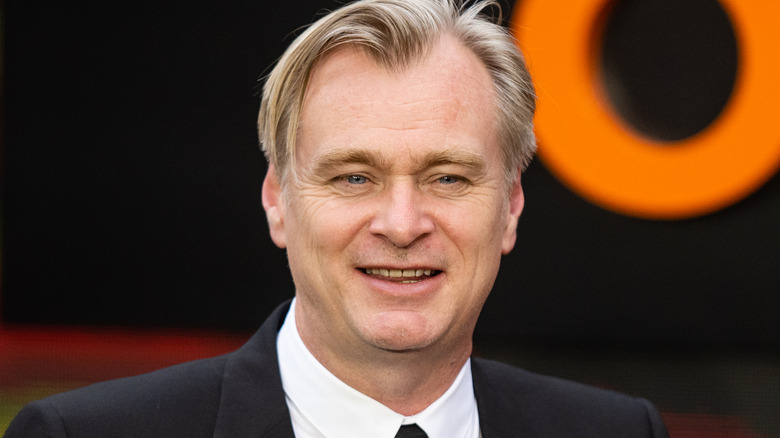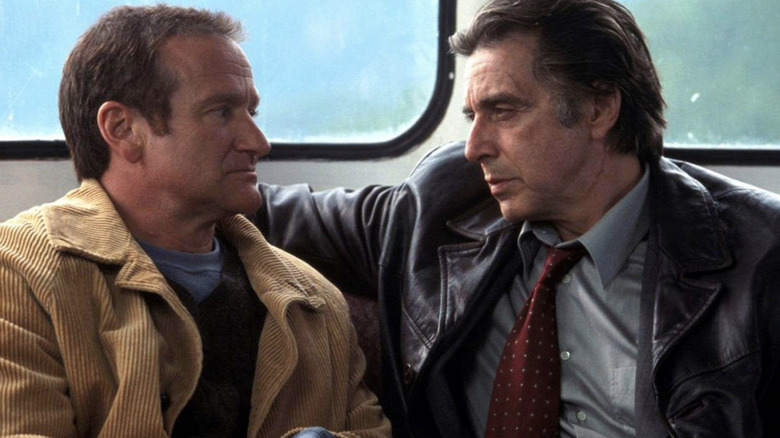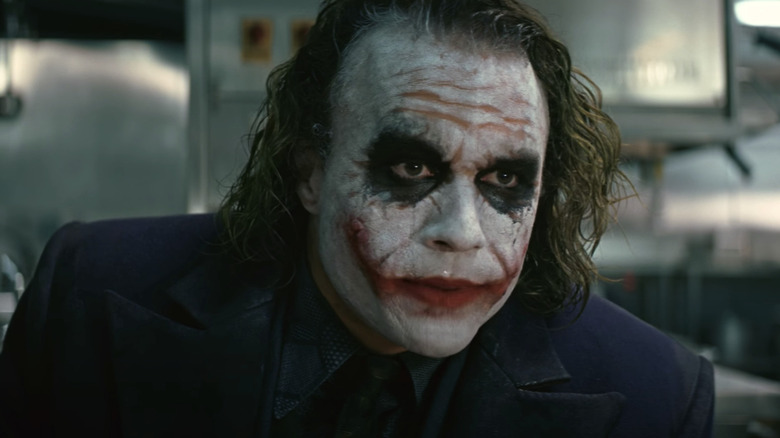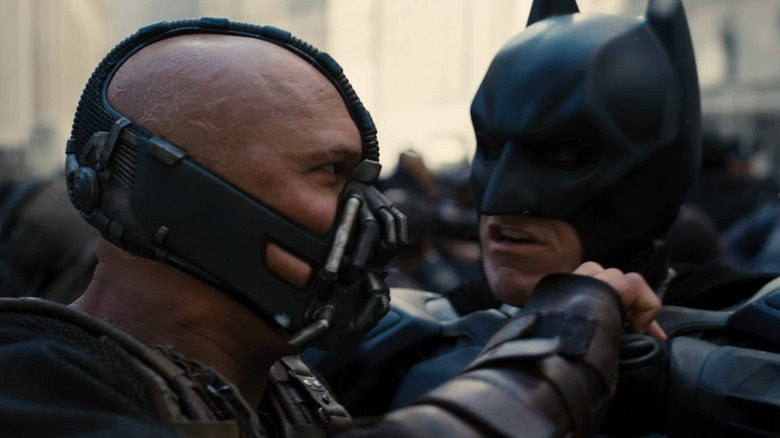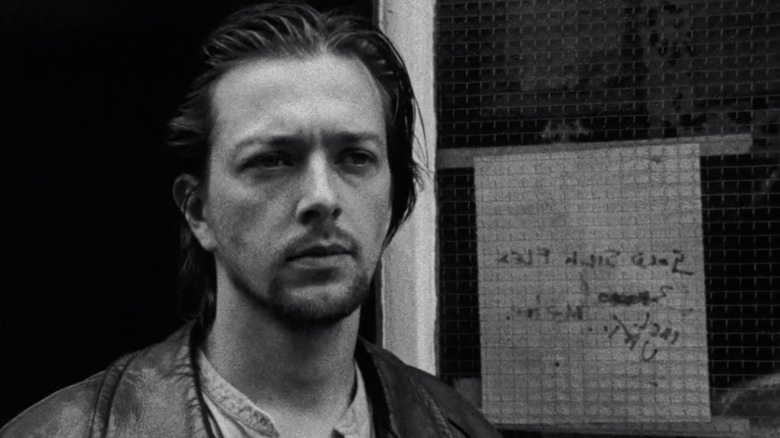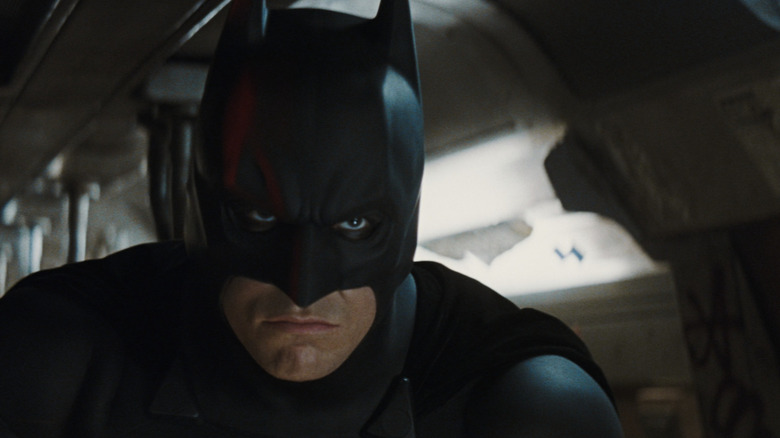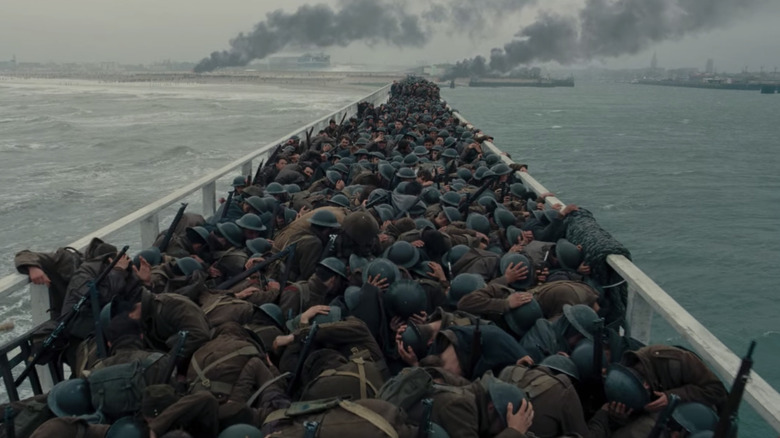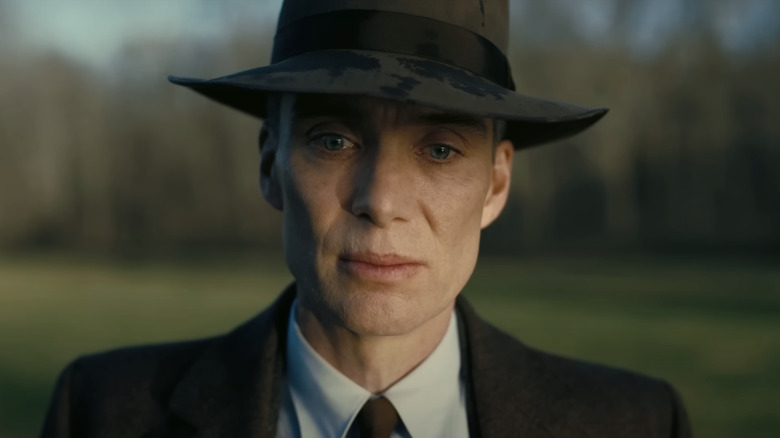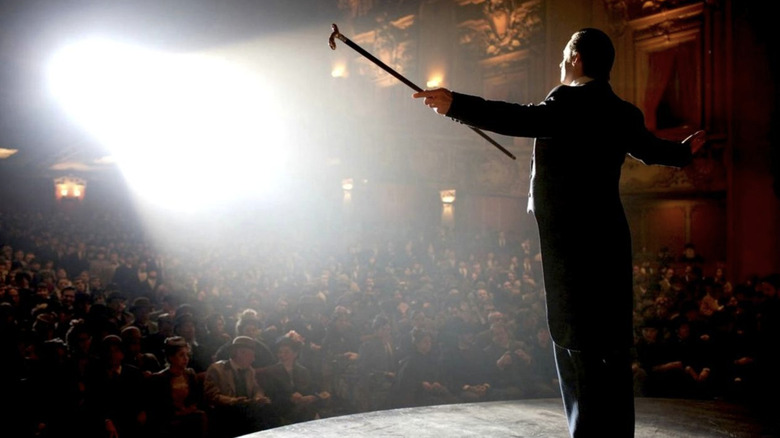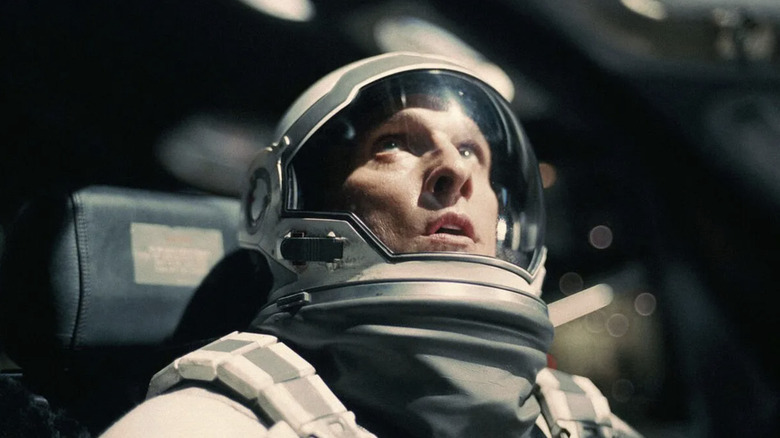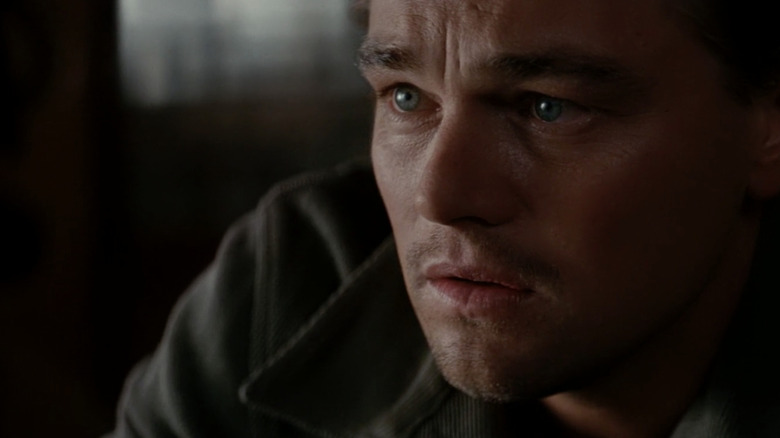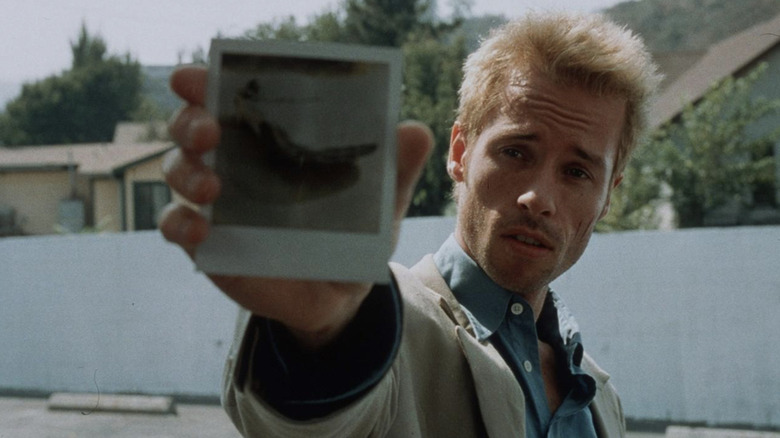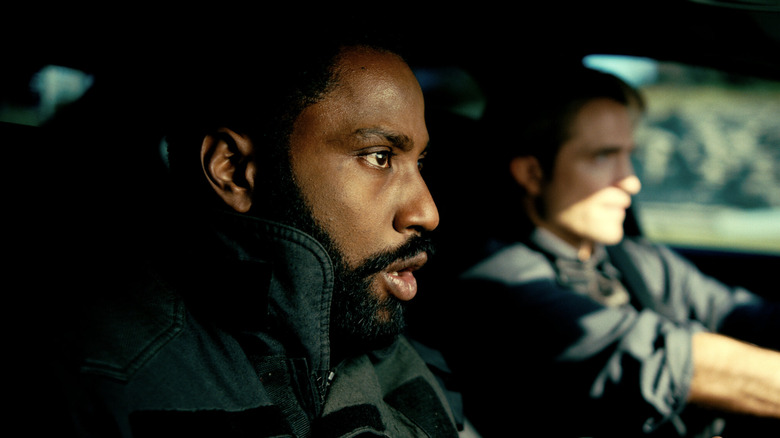Every Christopher Nolan Movie Ranked By How Confusing The Plot Is
Who doesn't love Christopher Nolan? The self-proclaimed champion for IMAX and analog film processes, Nolan has wowed audiences since the late 1990s with his intricate plots and explorations of time and space, all within intelligent blockbusters that raise the bar for popcorn entertainment. There's no doubt that Nolan is one of the greatest filmmakers of the 21st century, and one of the few who can seamlessly hop genres, from science-fiction blockbusters and superhero epics to historical dramas and period pieces about dueling magicians.
Whether you prefer "Memento," "Inception," or the "Dark Knight" trilogy, Nolan continues to excite audiences after a quarter century, including with his most recent "Oppenheimer," which is stunning critics everywhere. As Nolan's first biopic, "Oppenheimer" tells the story of the titular physicist who was the director of the Manhattan Project, doing so in a way that only Nolan knows how. Additionally, the film is Nolan's first R-rated feature since 2002's "Insomnia," and his first movie outside of Warner Bros. in over two decades.
Despite the director's rave reviews, audiences have criticized his mind-bending pictures as being a bit too confusing. Known for his often twisty endings and non-linear structures, Nolan has proven himself a capable storyteller, willing to bend whatever narrative and editing rules necessary to carefully craft his pictures exactly how he likes. But which is the most cerebral? Here are all of Christopher Nolan's films ranked by how confusing the plot is.
12. Insomnia (2002)
While the mystery behind Christopher Nolan's first studio feature "Insomnia" isn't terribly confusing, that doesn't make this thriller any less complex or compelling. Al Pacino as Los Angeles cop Will Dormer, who's sent to Nightmute, Alaska, to pair up with young rookie Ellie Burr (Hilary Swank) in an effort to solve the murder of a teenage girl. Robin Williams also stars as the killer Walter Finch, and boy is it a vast departure from his usual work.
Despite being the least Nolan-ish of his filmography, "Insomnia" is a depressing delight. As Dormer gets wrapped up in the case, he gets in too deep with the wrong killer. Ultimately, the picture culminates in a showdown between the cops and the killer, which shocks in classic Nolan fashion. As complex as the characters are, the plot of "Insomnia" is the furthest thing from confusing.
According to Tom Shone's "The Nolan Variations," Nolan believes "Insomnia" to be his most underrated picture. "The reality is it's one of my most personal films in terms of what it was to make it. It was a very vivid time in my life. It was my first studio film, I was on location, it was the first time I'd worked with huge movie stars."
11. The Dark Knight (2008)
Certainly among the most straightforward of Christopher Nolan's works, "The Dark Knight" is pretty a standard superhero epic, albeit taken to remarkable heights. As the second installment of Nolan's Batman trilogy, this 2008 blockbuster changed the way comic book movies were made, featuring powerhouse performances by Christian Bale, Michael Caine, and the late Heath Ledger. The only thing that could be deemed confusing about the plot of "The Dark Knight" is the Joker's (Ledger) overall plan, how it fits together, and why everything works so well.
Not only does it seem like the homicidal clown is miles ahead of Batman and the police, but most of the cause-and-effect events feel relatively random upon first watch. After all, the Joker wants to inspire chaos, which isn't exactly the most specific aim. Unsurprisingly, everything becomes clear by the end, with a distinct line drawn between Joker's introduction and Harvey Dent's (Aaron Eckhart) fall.
"The Dark Knight" was a massive success in every sense of the word, but especially for Nolan. Elated at how well his second Batman movie was received, Warner Bros. granted the director more creative freedom following "The Dark Knight" to pursue other, more original, projects. The results — movies like "Inception" and "Interstellar" — speak for themselves.
10. The Dark Knight Rises (2012)
The epic conclusion to Christopher Nolan's take on Batman, "The Dark Knight Rises" is a departure from the director's previous vision of Gotham City. Despite that, it served the trilogy well, closing the book on Nolan's tenure directing superheroes. Christian Bale's final performance as Bruce Wayne/Batman, "Rises" pulls our hero out of retirement for one final quest: saving his city from total annihilation.
While both of Nolan's previous Batman flicks were standalone adventures, "Rises" relies heavily on what happened in its predecessors. Given that this is the last in a trilogy, that makes sense. While many of the confusing moments in the "Dark Knight" trilogy can be explained fairly easily, "Rises" doesn't spend much time trying to answer all our questions. With vagaries about how Bane's strange life-saving mask works, how Bruce Wayne recovers from his broken back so quickly, and why Talia (Marion Cotillard) didn't reveal herself much earlier, there are a few head-scratchers when revisiting Batman's final chapter.
Despite that, the film made over $1 billion at the box office, making "The Dark Knight Rises" the highest-grossing Batman movie to date. The picture was praised by critics and audiences alike for being a satisfying conclusion to the trilogy. Apparently, not even the few confusing bits were enough to keep Bat-fans away.
9. Following (1998)
Coming off the heels of a time when every young, new director wanted to be Quentin Tarantino, Christopher Nolan forged his own path with his independent directorial debut, "Following." As the director, writer, co-editor, co-producer, and cinematographer, Nolan had complete creative control over his neo-noir crime thriller. Many of Nolan's future trademarks can be seen clearly in his first outing. His examination of obsession, his manipulation of scene order, and penchant for twist endings are all here, just on a small scale.
Where the film gets slightly confusing is at the end. After the Young Man (Jeremy Theobald) has gone from struggling writer to full-fledged thief, he's soon betrayed by his mentor Cobb (Alex Haw), who, yes, shares the same surname as Nolan's lead from "Inception." Cobb frames the Young Man for the murder of the Blonde (Lucy Russell), who he likewise tricks into helping him frame the Young Man to get his boss, the Bald Man (Dick Bradsell), out of the Blonde's blackmail. Confused yet?
Additionally, it doesn't make sense that the Bald Man wouldn't just have Cobb kill the Blonde more discreetly in the first place. Cobb didn't have to get involved intimately and could have axed her any time. He was certainly capable. Admittedly, Cobb's plan is fool-proof, and the Young Man goes down for Cobb's crimes as well as his own, making "Following" quite the tragedy.
8. Batman Begins (2005)
The most confusing of Christopher Nolan's "Dark Knight" movies, "Batman Begins" throws you right into the middle of Bruce's story. Often praised for its character-driven narrative and attention to detail regarding the titular hero's origin, "Batman Begins" was a huge step in the right direction from previous "Batman" pictures, and ultimately changed the way superhero origin stories were told moving forward. Not only did "Begins" put Nolan on the map as a blockbuster filmmaker, but it made Christian Bale a household name.
Possibly the most confusing plot point from "Batman Begins" is the microwave emitter. This Wayne Enterprises weapon is said to turn liquid into gas. This, combined with Scarecrow's (Cillian Murphy) fear toxin, is the most vital part of the League of Shadow's plan to tear down Gotham City from within. But, when the League turns it on in the middle of the ocean, not much happens short of pipes bursting on a freighter. Since human beings are made up mostly of water, it's strange that the machine doesn't do anything to the people surrounding it.
Additionally, Scarecrow had been pouring his fear toxin into Gotham's water supply for weeks, and though he states that the chemicals don't do much unless they're in gas form, it's pretty unbelievable that Ra's al Ghul's (Liam Neeson) plan to send the machine through the city didn't devastate Gotham more. Even grounded superhero movies remain a bit fantastical.
7. Dunkirk (2017)
Set during the Dunkirk evacuation of World War II, "Dunkirk" follows an ensemble cast across land, sea, and air as they fight to survive the German air raid. Under the direction of Christopher Nolan, what would generally be a pretty straightforward war drama turns into an intense thriller that switches between perspectives, piecing together parts of the evacuation. The first film to earn Nolan a Best Director nomination at the Academy Awards, "Dunkirk" ended up winning three well-deserved Oscars.
The movie does an excellent job of building suspense and crafting a narrative that's certain to get you to care about the specific characters Nolan has us following. Even if you're a history buff who knows all about the Dunkirk evacuation, you might not predict how everyone's story turns out, and that's for the best. Like many Nolan features, the erratic use of non-linear narrative structure is tough to grasp at first, especially when following such a large cast. Thankfully, it's still effective, even if it takes the first half or so of the movie to get into it.
Of course, the plot of "Dunkirk" itself is simple: survival. The whole film chronicles a large-scale military evacuation that was something of a disaster in its time, yet became one of the most daring feats of the war. Despite complications in character and structure, any confusions one might have regarding "Dunkirk" are largely settled by the end.
6. Oppenheimer (2023)
With the release of 2023's "Oppenheimer," many consider Christopher Nolan's first biopic to be his definitive work. With immaculate performances by Cillian Murphy — who has worked with Nolan five times previously, though this marks his first as a leading man — and Robert Downey Jr., not to mention a large ensemble cast that gets a bit lost in the shuffle, Nolan's meditations on a scientist's responsibility to society feel eerily relevant given the recent developments with A.I.
What could have been an uncomplicated exploration of the titular physicist turns out to be somewhat confusing right at the get-go. Following multiple plotlines (one of which is shot in black-and-white, just like "Memento"), "Oppenheimer" throws a number of characters at you right up front without much room to breathe. "The fact that Nolan presents all this in his trademark elliptical, non-linear manner, with some impressionistic visuals of atomic structures and fission explosions punctuating it, makes that first third a tough sit," noted Don Kaye in a review for Den of Geek.
Though there's no doubt that "Oppenheimer" is one of Nolan's best works — with many of his previous themes, techniques, and ideas about filmmaking well thought out and on display here — at three hours, the epic thriller isn't the easiest to sit through. Yes, like all Nolan projects, everything connects at the end, but the journey itself is far from a straightforward experience.
5. The Prestige (2006)
"Are you watching closely?" A true Christopher Nolan masterpiece, "The Prestige" is a solid installment in the auteur's filmography that deserves even more acclaim. The story of two dueling magicians, Robert Angier (Hugh Jackman) and Alfred Borden (Christian Bale), Nolan's psychological thriller dives deep into a professional rivalry that soon gets out of hand. Set in the late 1800s, "The Prestige" is one of those movies that you need to watch at least twice to understand the full scope of Nolan's genius plot, which continues to confuse audiences today.
Given the film centers on magicians, it makes sense that the sleight-of-hand would extend to the filmmaking process as well. Like many of his pictures, "The Prestige" follows a non-linear narrative structure. But the way the movie is structured isn't the only thing confusing about it; we can't forget the tricks themselves. Angier's and Borden's respective versions of "The Transporting Man" are mind-blowing to be sure, but it gets even more confusing when you inquire about their true identities.
The reveal that Borden is actually two people is shocking, as is the question of which one survives at the end — Jess' (Samantha Mahurin) father or her uncle? Additionally, it's clear that Angier used Tesla's (David Bowie) machine to create duplicates of himself, but is the "Lord Caldlow" we meet at the end the real Angier or a duplicate who has taken over his life? We may never know.
4. Interstellar (2014)
"Interstellar," Nolan's homage to "2001: A Space Odyssey," is one of the most beautiful movies he's made. In a dystopian 2067, Earth is dying and humanity needs a new home. Ultimately, this leads astronaut Joseph Cooper (Matthew McConaughey) and his team to the stars, jumping through a wormhole next to Saturn in order to find a new world for humanity to populate.
Though the movie was promoted as being scientifically accurate, "Interstellar" was still a work of pure science-fiction. There are plenty of examples of this, the most obvious being the ending when Coop is sent through a black hole, winding up in a fifth-dimensional tesseract that exists outside of space and time. This allows him to become his daughter's childhood ghost, giving her the clues she needs to save their world. For some reason, Coop believes this tesseract was built by future humans with time-traveling capabilities, sending him back to Earth as his reward.
For even the biggest of sci-fi nerds, that one was a bit of a stretch. To this day, the entire tesseract sequence still confuses people, and for good reason. Not only is it a deus ex machina, but it feels a bit out of place in Nolan's otherwise "scientifically grounded" world. Still, who doesn't want their own TARS?
3. Inception (2010)
Between his second and third "Dark Knight" movies, Christopher Nolan shocked audiences everywhere with his dream-centered action thriller "Inception." Starring Leonardo DiCaprio as Dom Cobb, an expert "extractor," this installment in Nolan's filmography is still confusing even after watching it a couple dozen times. Centering on a group of "dream-stealers" who either take or implant ideas from people's subconscious, "Inception" confronts audiences with a haunting question: how do you know whether you're you still dreaming?
Thankfully, Nolan-via-Cobb explains to the audience-via-Ariadne (Elliot Page) how inception works over the course of the movie, so the actual mechanics aren't too complicated. However, Cobb's tragic backstory, especially concerning the death of his wife Mal (Marion Cotillard), who continues to torment him in the dream world, can get a bit out of hand. Cobb's spinning top totem is meant to keep him grounded in the real world (if it continues to spin, then he's still dreaming), but during his final reunion with his children, he ignores the totem completely and embraces his family.
While the general plot of "Inception" isn't overly complicated, the ending is among Nolan's most oblique. To this day, there is still heavy debate on whether Cobb is in the real world or his own fantasy. "If I'm in it, it's reality. If I'm not in it, it's a dream," said actor Michael Caine about "Inception's" ambiguous end, revealing Nolan's supposed intentions (via Independent). Nevertheless, the debate continues.
2. Memento (2000)
The movie that put Christopher Nolan on the map, "Memento" is based on a short story written by his brother Jonathan Nolan and may still be one of his most compelling pictures. Released in 2000, this psychological neo-noir thriller wowed audiences from the get-go, even as it confused them in the process. Starring Guy Pearce as Leonard Shelby, a man with a short-term memory disorder hell-bent on finding the man who killed his wife, "Memento" keeps you on your toes, even if you're not sure why.
Admittedly, "Memento" is meant to be confusing. Just as Leonard doesn't know exactly what's going on, neither do we, and that's sort of the point. Between the color and black-and-white narratives, each moving forward or backward in time, it's easy to be confused by what's happening and why. But as the cause-and-effect becomes clear, so does Leonard's complete (and tragic) story. It's the non-linear structure that makes "Memento" work so well, and why it's still one of Nolan's best.
The film's Special Edition home video release includes a bonus version of "Memento" that can be played in chronological order, and while it tells a far less confusing narrative, it forgoes everything else that made Nolan's original thriller great in the first place. Part of the movie's charm is the mystique attached, meaning that without some confusion, the appeal quickly falls apart.
1. Tenet (2020)
While some might consider "Oppenheimer" the most Christopher Nolan-y Christopher Nolan film, it could be argued that "Tenet" fits the bill. One of the few movies to get a theatrical release in 2020, Nolan delivers his take on the espionage thriller via his favorite trick: messing with time. Here, we follow The Protagonist (John David Washington) and his handler Neil (Robert Pattinson) as the former learns how to manipulate time in order to stop a Russian oligarch from contributing to a global catastrophe.
Nolan's journey into the spy genre offers everything we could ask for, and some things we couldn't. While the concept of interacting with the present by moving either forward or backward through time is admittedly fascinating, the way it's executed leaves us with way more questions than answers. More than any of Nolan's other works, "Tenet" requires multiple viewings to understand the full scope and scale. "Don't try and understand it," our hero is told. "Feel it." It's hard not to see this as Nolan's way of clueing the audience in on the absurdness of it.
"'Tenet' is difficult to understand," wrote Mick LaSalle of the San Francisco Chronicle. "But even worse, it inspires little desire to understand it." Of course, not all of Nolan's movies can be blockbuster spectaculars, but to this day, audiences are still split on "Tenet," no doubt due to the confusing nature of inverted time.
